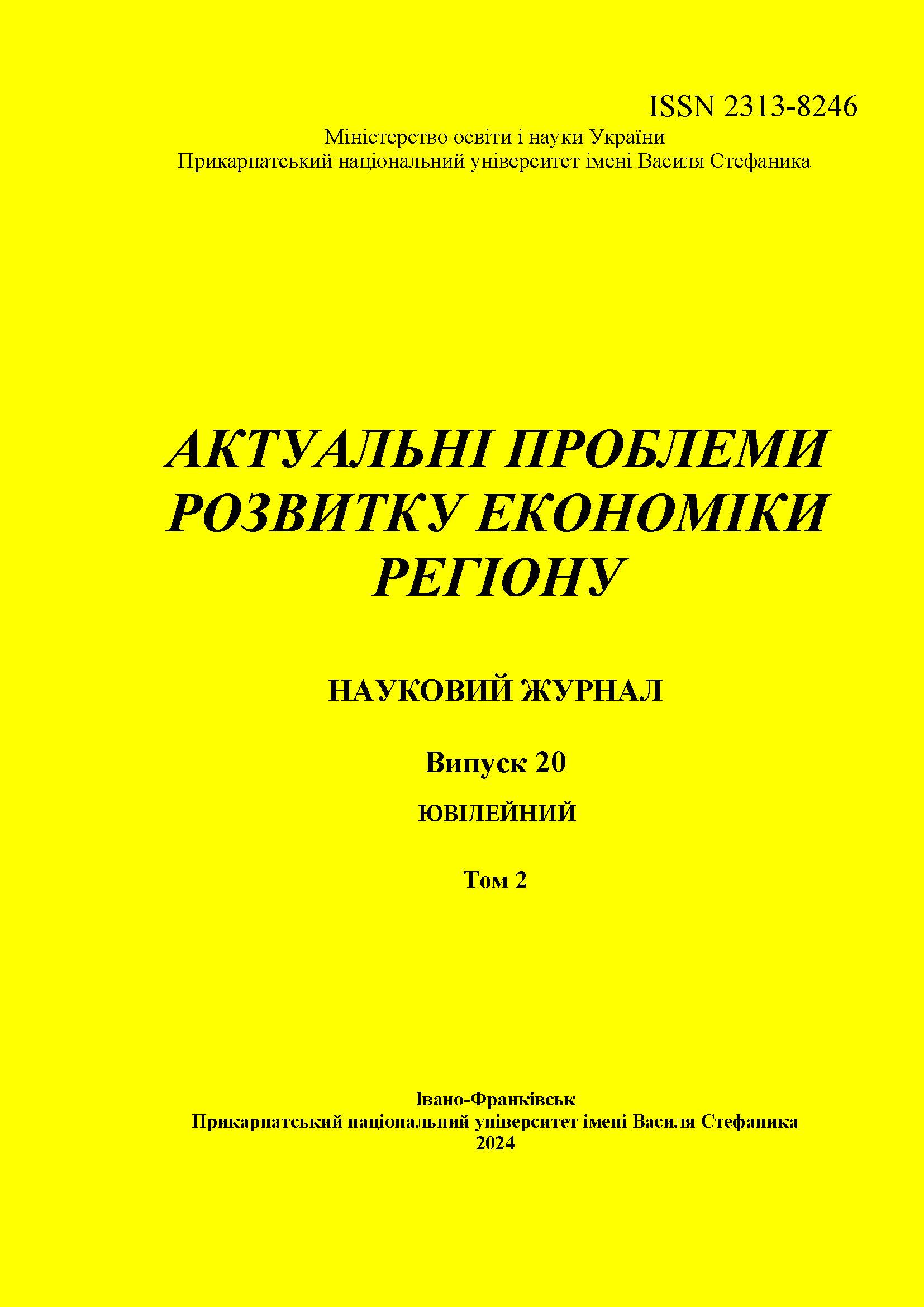ОСОБЛИВОСТІ ТУРИСТИЧНО-РЕКРЕАЦІЙНОЇ СФЕРИ В ЕКОНОМІЦІ ТЕРИТОРІАЛЬНИХ ГРОМАД ЛЬВІВЩИНИ
DOI:
https://doi.org/10.15330/apred.2.20.213-222Ключові слова:
туризм, територіальні громади Львівщини, туристично-рекреаційна сфера, історико-культурні туристичні ресурси, негативний вплив війниАнотація
Мета статті полягає у дослідженні особливостей туристично-рекреаційної сфери в економіці територіальних громад Львівщини в умовах воєнного стану в Україні. В даній статті досліджено Львівщину як один з найбільш привабливих регіонів для туризму в Україні. Обґрунтовано цінність історико-культурних туристичних ресурсів Львівщини, які привертають увагу відвідувачів. Здійснено групування туристично-рекреаційної діяльності на Львівщині за основними категоріями, що надають широкий спектр можливостей для туристів у Львівській області, незалежно від їхніх інтересів та вподобань. Досліджено і описано інфраструктуру громад Львівщини, яка відіграє важливу роль у розвитку туристично-рекреаційного потенціалу регіону, створюючи комфортні умови для туристів і рекреантів та сприяють зростанню їх потоку. Виокремлено основні складові інфраструктури, які впливають на туристично-рекреаційний сектор Львівщини. Акцентована увага на наявності на Львівщині розвиненої інфраструктури територіальних громад, що є ключовим фактором, який сприяє зростанню туристичного руху в регіоні, створюючи комфортні умови для відвідувачів і сприяючи розвитку туристичної індустрії. Підкреслено, що інтенсивний розвиток туризму на Львівщині можливий за умови вирішення наявних проблем органами місцевого самоврядування. Обґрунтовано важливість застосування принципів сталого використання природних ресурсів у туристично-рекреаційній діяльності Львівщини і наведено їх значення. Обґрунтовано негативний вплив війни на туристично-рекреаційну сферу територіальних громад Львівщини. Доведено серйозний вплив війни на туристично-рекреаційну сферу територіальних громад Львівщини, що веде до великої кількості негативних наслідків для розвитку туризму та місцевої економіки. В статті запропоновано перспективні напрями для розвитку туризму в різних територіальних громадах Львівщини. У статті досліджено особливості туризму та рекреації в економіці територіальних громад Львівщини. Розглянуто вплив туристичної галузі на соціально-економічний розвиток регіону, а також ресурси та стратегії, які можуть бути використані для максимізації її потенціалу.
Посилання
On Tourism. The Law of Ukraine. No. 324/95, Article October 16, 2020. Legislation of Ukraine. Verkhovna Rada of Ukraine, zakon.rada.gov.ua/laws/show/324/95-%D0%B2%D1%80#. Accessed 27 February 2024.
On approval of 2026 Tourism and Resorts Development Strategy. Resolution of the Cabinet of Ministers of Ukraine, No. 168-r 2017, Mar 16,. Legislation of Ukraine. Verkhovna Rada of Ukraine,
zakon.rada.gov.ua/laws/show/168- 2017-%D1%80#Text. Accessed 29 February 2024.
On Voluntary Unification of Territorial Communities. The Law of Ukraine. No. 157-VIII. Verkhovna Rada of Ukraine, zakon.rada.gov.ua. Accessed 29 February 2024.
Alieva, A.Yu. “Modern business models for the development of the tourism and recreation sphere in Ukraine.” Ukrainian Journal of Applied Economics, no. 5(1), 2020, pp. 228-235, https://doi.org/10.36887/2415-8453-2020-1-27.
Boretska, N.P., & G.O. Krapivina. “Research directions for the development of the tourism and recreation sphere as an object of state administration.” Economic Bulletin of Donbass, no. 3(35), 2021, pp. 147-154, https://doi.org/10.12958/1817-3772-2021-3(65)-147-154.
Zhuk, P. V. “Tourism and recreation sphere of the region as an object of competitiveness research.” Regional economy, 2022. no. 104 (2), pp. 17-24, https://doi.org/10.36818/1562-0905-2022-2-2.
Korkuna, O. I. The potential of the tourism and recreation sphere in the development of the economy of territorial communities of Ukraine: monograph. Lviv, Ivan Bobersky Lviv State University of Physical Culture, 2020.
Hrytsko, R., Kvasnii, L., & Y.Shulzhуk. “Modern approaches to the management of the financial objectives of the territorial community.” Středoevropský věstník Pro vědu a výzkum, no 10, 2022). Publishing house Education and Science, czvestnic.info/ojs/index.php/cz_ojs/article/view/171. Accessed 21 February 2024.
Pravdyvets, O.M., Shcherban, O.Ya., Bilyk, R.R., Kvasniy, L.G., & L.P.Hrynash. “Economic security of enterprises under modern challenges: pragmatics and vectors of strengthening.” Ukrainian Journal of Applied Economics and Technology, no. 8 (1), 2023, рр.194-201, https://doi.org/10.36887/2415-8453-2023-1-28
Kvasnii, L., Moravska, O., Malyk, L., Shulzhyk, Yu., Orlova,O., & O.Scherban. “Scenarios of the development of enterprises of the tourist industry of Ukraint in the conditions of the war and post-war periods.” Financial and credit activity: Problems of theory and practice, no. 2 (49), 2023, pp. 313-325, https://doi.org/ 10.55643/fcaptp.2.49.2023.3999
Leiper, N. Tourism Management. Sidney: Pearson Education Australia, 2004.
##submission.downloads##
Опубліковано
Як цитувати
Номер
Розділ
Ліцензія

Ця робота ліцензується відповідно до Creative Commons Attribution-NonCommercial-NoDerivatives 4.0 International License.
Автори, які публікуються у цьому журналі, погоджуються з наступними умовами:
- Автори залишають за собою право на авторство своєї роботи та передають журналу право першої публікації цієї роботи на умовах ліцензії Creative Commons Attribution License, котра дозволяє іншим особам вільно розповсюджувати опубліковану роботу з обов'язковим посиланням на авторів оригінальної роботи та першу публікацію роботи у цьому журналі.
- Автори мають право укладати самостійні додаткові угоди щодо неексклюзивного розповсюдження роботи у тому вигляді, в якому вона була опублікована цим журналом (наприклад, розміщувати роботу в електронному сховищі установи або публікувати у складі монографії), за умови збереження посилання на першу публікацію роботи у цьому журналі.
- Політика журналу дозволяє і заохочує розміщення авторами в мережі Інтернет (наприклад, у сховищах установ або на особистих веб-сайтах) рукопису роботи, як до подання цього рукопису до редакції, так і під час його редакційного опрацювання, оскільки це сприяє виникненню продуктивної наукової дискусії та позитивно позначається на оперативності та динаміці цитування опублікованої роботи (див. The Effect of Open Access).


